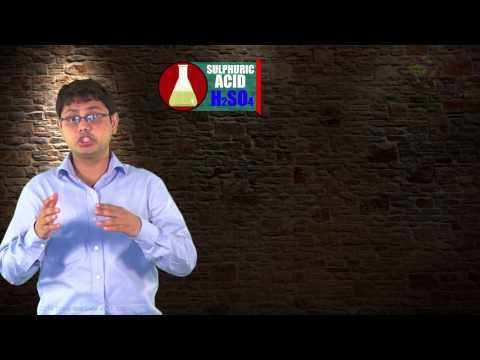What are Acids?
Acids are compounds containing hydrogen that can be replaced by metal. Acid dissolves in water to form hydrogen ions (H+). Acids are proton donors. Acids have a pH of less than 7.
Table of Contents
What are Dilute Acids?
Dilute acids contain a large amount of water. A concentrated acid can be diluted with the addition of water.
All acids may be an organic or inorganic substance which releases hydrogen ions (H+) in water. Hence, acid is defined as “a substance which gives out hydrogen ions when dissolved in water”.
Acids that release many hydrogen ions in water are strong acids. Inorganic acids like hydrochloric acid, nitric acid and sulphuric acid are strong acids. Acids that release a few hydrogen ions in water are weak acids. Organic acids such as acetic acid, citric acid and tartaric acid are weak acids.
Concentrated acids are stronger acids than dilute acids. Concentrated acids contain very little water. Acids are not stored in metallic containers because they react with metals and corrode them.
Recommended Videos
Does Dilution Strengthen or Weaken an Acid?

What are Acids, Bases and Salts?

Uses of Acids and Bases

Understanding Dilute Acids
Acids are corrosive in action. When we cook acidic food in brass or copper utensils they react with the metal and corrode them. Copper forms copper salt when combined with acid. Copper salts are poisonous and spoil the taste of cooked food. This is why we do not store liquid food in metallic containers. Even tea should be served in copper cups.
Metallic containers made from brass or copper are coated with Tin, a bright white metal. Tin is non-reactive to acids and hence prevents food poisoning. Nowadays we make use of stainless steel utensils for cooking food. Robert Boyle (1627-1691) was the first to study the properties of acids and described them as sour, corrosive and turning blue litmus red. Lavoisier, a French Chemist, in 1774 stated that certain oxides of non-metals when dissolved in water form acids. Thus, according to him, water was an essential part of acid.
Examples of Acids
Acids are very useful in controlling and steering many chemical reactions. Examples of acids are hydrochloric acid also known as muriatic acid and present in gastric juices. Sulfuric acid is also referred to as vitriol and several foodstuffs such as yoghurt, vinegar and lemon.
Examples of some mineral acids and organic acids are shown in the table.
| Acid | Formula | Physical state when pure | Type of acid |
| hydrogen chloride dissolved in water (hydrochloric acid) | HCl | gas | Mineral acids |
| sulphuric acid | H2SO4 | liquid | |
| nitric acid | HNO3 | liquid | |
| ethanoic acid | CH3COOH | liquid | Organic acids |
| citric acid | Complex | solid | |
| tartaric acid | Complex | solid |
Properties of Dilute Acids
Although there are many acids, there are several properties they have in common.
Taste – Acids have a sour taste.
Aqueous solution – Acids dissolve in water to form solutions which conduct electricity. Some acids completely ionize when they dissolve in water. These are called strong acids. The mineral acids are strong acids. Organic acids only ionize slightly when they dissolve in water. Some molecules remain unionized. They are called weak acids.
Indicators – Acids change the colour of indicators, blue litmus red.
Chemical Properties of Dilute Acids
1. Acids react with metals to release hydrogen gas
Take some granules of zinc in one glass test tube and magnesium in another glass test tube. Pour dilute hydrochloric acid in one and sulphuric acid in the second. The reaction takes place and a gas is released in both. Test the gas for hydrogen by bringing a burning splinter near the mouth of the test tubes. Gas burns with a pop sound showing that it is hydrogen gas.
Zn + 2HCl → ZnCl2 + H2
Mg + H2SO4 → MgSO4 + H2
2. Acid reacts with a base (metallic oxide) to form salt and water
2HCl + ZnO → ZnCl2 + H2O
Acid reacts with an alkali (hydroxide) to form salt and water.
HCl + NaOH → NaCl + H2O
In these reactions, acid neutralizes the base to form neutral substances like salt and water.
3. Acids reacting with Metals
The reactions of dilute acids with a variety of different metals can be investigated, small fresh samples of metals are placed in 2ml samples of dilute hydrochloric or sulfuric acid. The rate of reaction depends on the
-
-
-
- Concentration of the acid – if the acid is too dilute the reaction is very slow.
- Type of metal – some metals (eg: magnesium) react faster than other metals.
- Surface area of the metal – powdered metals react faster than large lumps.
- Temperature – warm acid solutions attack metals faster than cold solutions.
-
-
For acids such as dilute hydrochloric acid and dilute sulfuric acid the general equation for their reaction with reactive metal is
Acid + Metal → Ionic compound + Hydrogen gas
Acids are very useful in controlling and steering many chemical reactions. The products obtained from two very specific reagents can, in fact, change drastically by varying the acidity of the reaction environment.
Frequently Asked Questions on Dilute Acids
What is concentrated dilute acid?
A dilute acid is not a very concentrated one. When adding water, you can dilute an acid solution even further. Strong and weak characterize the tendency of the acid to dissociate, regardless of concentration, into an aqueous solution. Concentrated acid is a solution with a high concentration of hydrogen ions in molars.
How is acid diluted with water?
Water molecules reduce the concentration of ions in the solution by adding water to an acid or base. The concentration of H+ ions decreases when an acidic solution is mixed with water, and the solution pH increases toward 7. The acid is less acidic.
What is meant by concentrated and dilute?
If a sufficiently large quantity of solvent dissolves a small volume of solvent, the solution is considered a dilute solution. A concentrated solution is when the quantity of solvent dissolved is relatively high compared to the quantity of water, then the concentrated solution is called a solution.
Is dilute acid dangerous?
Bottles of dilute acids are labelled with a warning symbol to indicate that they can irritate your skin or cause any other minor damage to your health. It ensures that it will turn red or blistered if one of them makes contact with your skin.
Does dilute HCl conduct electricity?
Ionic systems have power conductivity capabilities. Therefore, as it forms ions, hydrochloric acid (HCl in water solution) can conduct electricity. This does not conduct electricity unless you add hydrogen chloride (pure HCl) into the water.


Comments